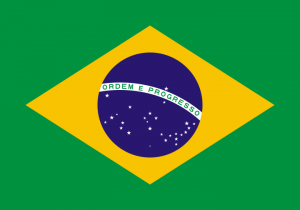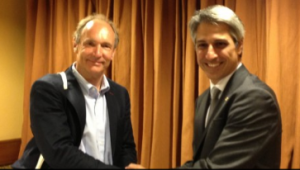 Carolina Rossini is Project Director, Latin America Resource Center, New America Foundation
Carolina Rossini is Project Director, Latin America Resource Center, New America Foundation
Tim Berners-Lee’s visit to Brazil last week has rekindled hopes for a civil society frustrated by six postponed votes on the bill known as “Marco Civil.” This groundbreaking federal legislation would guarantee civil rights in the use of the Internet, and is sometimes called a “Constitution for the Internet.” For the bill’s rapporteur, Representative Molon, having the inventor of the World Wide Web visit and publicly support the Marco Civil is an essential step in breaking the legislative logjam.
The main goal of Marco Civil is to create a positive view of legislative action towards the Internet, one that takes international norms of human rights, civil rights, and civil liberties and modernizes them for the digital age. The international trend has instead been to pursue the criminalization of behaviors that many of us take for granted online or that are core acts of free expression. Thus, the Marco Civil has two roles: one as key legislation inside Brazil, and another as a model for other nations interested in instituting a citizen-centric view of Internet policies.
In his declarations to the Brazilian press and the crowd at the WWW2013 event in Rio de Janeiro, Berners-Lee affirmed: “With the Marco Civil da Internet, you are on the brink of a remarkable achievement which would be a historic step not just for Brazil but for the world in securing an open and free Web for all. Passing without delay this legislation would cement Brazil’s reputation as a world leader in democracy and social progress.”
Brazilian civil society has advocated for the adoption of the Marco Civil bill since early 2009 as part of a strong and broad social reaction to a series cybercrime bills proposing harsh penalties for routine online activities, such as file sharing, access to data or violations of terms of use. The intention was to defeat bill PL 84/99, known as the Azeredo Bill, which clearly opposed, in its initial drafts, human rights principles and change the tone of the debate over a civil rights framework.
The current draft version of the Marco Civil bill, after several revisions, still falls short of some freedom of expression advocates’ demands regarding due process for content takedown.
One issue that the current draft of the Marco Civil does not address – due to last minute changes and pressure from the content lobby in Brazil – is the issue of ISP liability in content takedown due to copyright infringement. Policy makers decided to leave this issue to be addressed within the process of the reform of Brazil’s Copyright law – under way in the Brazilian congress for at least the last 5 years. Significant concerns remain about the Copyright Law bill’s potential impact on Internet access and users’ rights. After the former Minister of Culture instituted multiple changes that are seen as directly favoring the copyright cartel, the bill has stagnated under Marta Suplicy, the new Minister of Culture. Suplicy is a well-known Labor Party politician from São Paulo who represents the return of ex-president Lula’s progressive agenda. She has brought back to the ministry a number of personnel who led the original Copyright Reform process under Gilberto Gil’s leadership. This is a development that rightly raises hopes for copyright reform that works with the Marco Civil law rather than against it.
Despite deep concern about this aspect of the legislation and normal horse-trading over the alliances that needed to be formed to gather broader support for the bill, Representative Molon is optimistic that the Marco Civil will finally come to vote in the Chamber of Deputies before July 2013.[1] The main barrier at this time to its passage is Brazil’s strong lobbying bloc of telecoms, which objects to provisions regarding net neutrality and log retention.
Mr. Molon believes that the current version preserves the Web as it was intended: an open and decentralized network, in which users are the engine for collaboration and innovation. It deals with crucial topics such as privacy, net neutrality, freedom of expression, and more. And it has as its foundation the guarantee of human rights, of citizenship and the preservation of the diversity and the social purpose of the web.[2] Berners-Lee’s visit was well received by Molon and his team and has created a positive buzz in the Brazilian Congress corridors.
The Marco Civil bill also represents a strong legacy of participative democracy, as one of its key strengths is the extensive online and offline consultation process. The dozens of meetings; hundreds of submissions, thousands of tweets, and tens of thousands of website visits during the consultation period at E-Democracia (an award winning platform) are all testament to the public interest and engagement the Bill generated. This is a model of technology-empowered democracy exercise that might be replicated by other countries looking for expanding civil society participation on policy making and open government.
At the end of his comments, Berners-Lee emphasized his own great interest on the topic of net neutrality, and noted that Brazil is one of the first countries to try to protect net neutrality in law and urging that net neutrality be considered a sacrosanct element of network policy.
Berners-Lee and the Brazilian civil society are not alone in the fight for the approval of the Marco Civil. A wide array of global tech companies and such as Google, Mozilla, Facebook, and Yahoo!, have publicly stated their support for Marco Civil, and over 15,000 people have tweeted on the topic. Brazilian business associations, such as the ISPs (Abranet), Mercado Livre (Brazil’s major online marketplace), and the Brazilian Association of Radio and Broadcasters (Abert- including Brazil’s largest TV broadcaster Globo), also fully support the bill. The Brazilian President, Mrs. Rousseff, in her annual announcement to Congress has mentioned Marco Civil as a major point for the Government in 2013.
The Marco Civil is a fascinating and innovative Bill and the world – in addition to the World Wide Web and its inventor – is watching its progress. We all hope that this draft Bill is passed as soon as possible with no further modifications, in both Brazilian legislative houses and finally signed by the president, in order to turn a dream into a reality.
How is the current non-officially published language:
A version of the bill can be accessed at the House of Representative Website, here. NOTE: However, the amended and most current version of the Bill has not been made officially public. Below, we transcribe the main and most disputed changes:
Article 9: Net Neutrality
Original clause: “The party responsible for the transmission, switching or routing of data has the obligation of granting equal treatment to every data package, with no distinction by content, origin and destination, service, terminal or application; any traffic discrimination or degradation that does not arise out of the technical requirements necessary to the adequate provision of services is prohibited, in accordance to further regulation.
Sole Paragraph. In the provision of Internet connection services, it is prohibited to monitor, filter, analyze or supervise the content of data packages, except in the circumstances allowed by the law.”
Revised version with the addition of 3 new paragraphs:
(1) Discrimination or degradation of traffic shall be governed by a Presidential Decree and may only result from:
i. Indispensable technical requirements for an adequate offer of services and applications and
ii. Prioritization of emergency services
(2) In the event of traffic discrimination or degradation, as foreseen in paragraph 1, the aforementioned agent in charge shall:
i. refrain from causing damages to users
ii. respect free competition, and
iii. previously inform its users on a transparent, clear and sufficiently descriptive manner of the adopted traffic management or mitigation measures.
(3) When providing paid or free Internet connection, as well as on the transmission, switching or routing, it is forbidden to block, monitor, filter, analyze or inspect the content of data packets.
B) Article 15: ISP liability for third party content
(NOTE: Brazil is in the top of content removals within Google and Twitter transparency reports)
Original: “Except otherwise established by law, Internet application providers can only be responsible for the damages caused by content generated by third parties if, after receiving a specific judicial order, they do not take action to, in the context of their services and under the established time frame, make unavailable the infringing content.
Sole Paragraph. The judicial order must contain a clear and specific identification of the infringing content, allowing for the correct localization of the material, under penalty of losing validity.”
Revised – current language:
“Art. 15. In order to ensure freedom of expression and avoid censorship, Internet service providers may only be held liable for the damages arising from third party- generated content if, upon receipt of a specific court order, the provider fails to take appropriate measure, within the technical limits of its service and the specified time frame, to make unavailable the content deemed as infringing, except as provided otherwise.
§ 1º The judicial order must contain a clear and specific identification of the infringing content, allowing for the correct localization of the material, under penalty of losing validity.
§ 2º The foregoing shall not apply in the case of infringement of copyright and related rights.”
[1] http://uncut.indexoncensorship.org/2013/03/threats-to-online-free-speech-are-a-civil-society-defeat-says-internet-bill-of-rights-sponsor/
[2] See the website of the copyright reform movement at http://www.reformadireitoautoral.org/.





